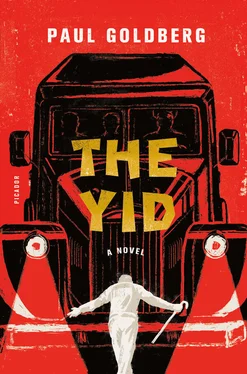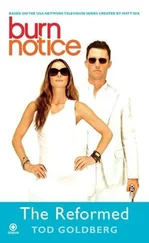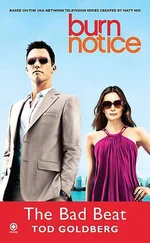Small drops of blood begin to trickle out of the four holes made by incisors, slowly turning into gentle streams. As the skin stretches, the streams grow stronger and the blood broadens its path, spilling out at intervals like waves.
Ol’ga Fyodorovna declines to watch. “This is barbaric,” she says, her hands shielding her from this grotesque sight. “An exploding aneurysm is your idea of a spectacle. How could you make yourself so detached from human life?”
“If I can’t analyze, I can’t help. If I can’t help, I can still analyze.”
“I see, again, the primacy of reason.”
“Proudly so. And what is the nature of your objection to it?”
“Make it objections, plural: aesthetic, ethical, moral, religious. In alphabetical order.”
“So it’s a clear conscience you want, Ol’ga Fyodorovna?”
“No, I want to be able to look at myself in the mirror.”
“You hunger for beauty, then?”
“You guessed incorrectly. Dignity.”
* * *
In the morning of February 28, when Lewis returns to the dacha, he notes that the place is starting to look like a workers’ dormitory in Magnitogorsk.
There are two cots for Kogan and Levinson, a cot for him, and another cot, behind a stretched-out sheet, for Ol’ga Fyodorovna.
During the previous night, Moisey Semyonovich slept on the table, but this morning the table stands bare. Taking off his boots, Lewis notes that the floorboards feel wet from scrubbing. The smell of ammonia makes it difficult to remain inside.
Levinson and Kogan are awake.
“What happened?” Lewis asks.
“The militia paid us a visit,” says Levinson, sitting up.
“They were working with the comrades you deposited in the well,” says Kogan.
“And…”
“They took us by surprise. They had two guns to our serrated bread knife, and bare hands, and teeth,” says Kogan.
“I knew Moisey Semyonovich would do something extraordinary,” says Levinson. “He had that murderous look.”
“And he did,” says Kogan. “Never saw a braver man.”
“Did he survive?”
Levinson shakes his head.
“He saved us all,” says Kogan.
* * *
At 8 p.m., as darkness thickens, they gather at the well at Number Four Zapadnaya.
Another pile of bodies, two in burlap sacks, a third laid separately, covered with a red banner.
The burlap sacks go over the edge with no one saying a word, not even Ol’ga Fyodorovna, who bows her head, presumably in prayer.
“Vechnaya slava tebe, boyets Rabinovich,” says Levinson as Kima and Kogan lift the flag-draped sack. Eternal glory to you, fighter Rabinovich. He nods.
“Wait,” says Ol’ga Fyodorovna. “I want to speak.”
Levinson raises his hand. He is willing to wait.
“Ne poet ty Solomon, ne soldat. Ty ubiytsa, Solomon, ty bandit prostoy. Net, ne zrya nad toboy voron kruzhitsya.” You’re not a poet, Solomon, not a soldier. You are a murderer, Solomon, and a common thug. The raven circles above as you move along.
“Moisey challenged death,” she continues, her voice strained. “V krovi u nas eto — smerti vyzov brosat’.” It’s in our blood — to challenge death.
“So off we go, to cover pillboxes with our bodies, charging out of the trenches and into the open fields, rushing into mad duels. Or, worse, we write our challenge in verse and show it to friends.”
Steadily, her voice grows firm, grounded, balanced. “Death acts without challenge, too. Challenged, it acts sooner, better, enjoying the slaughter of the unprotected, valorous fools, like my dear Moisey. Again I play a widow’s role.
“Ya dumala, stara uzhe.” She pauses. “I thought old age had come. I’ve had my hussars, my little red and white lieutenants. My poets, too. But the contagion struck again, and now the well is full, the raven circles, and we will follow our doom.”
She steps aside and silence falls.
“He died for justice,” Kogan says. “Surrounded by slaves, Moisey was free.”
“Vechnyy mir prakhu tvoyemy, boyetz Rabinovich,” says Levinson. This is the second of his standard funeral remarks. Eternal peace to your remains, fighter add-the-last-name.
“A Marxist who invokes the eternal parts roads with Marxism,” objects Ol’ga Fyodorovna.
“So be it,” says Kogan. “If our non-Jews feel so moved, I’ll join them in our Kaddish. Coming from them, it probably means something.”
They stumble through the mysterious, prickly words of the prayer for the dead: a Godless Negro, a half-nun, half-harlot, and a wavering Marxist Jew.
“Levinson, are you able to sing ‘ Di Shvue’ without idiocy? Moisey was a Bundist, after all.”
Levinson begins quietly:
“Brider un shvester fun arbet un noyt,
ale vos zaynen tsezeyt un tseshpreyt,
tsuzamen, tsuzamen, di fon iz greyt.”
(Brothers and sisters in labor and fight,
Those scattered far and wide,
Assemble, assemble — the banner stands poised.)
His voice is goat-like. Kogan’s singing abilities are so horrendous that he sings only symbolically, which is to say not at all.
During the second verse, Kogan hears a young woman’s voice:
“Zi flatert fun tsorn, fun blut iz zi royt!
A shvue, a shvue af lebn un toyt.”
(It flutters with woe, with blood it is red!
We swear. A life-and-death oath we swear.)
“Kenst ot a di lid?” he asks Kima in Yiddish. You know this song?
“Yes,” Kima replies in Russian. “This is what my father sang when they took him away.”
“Himl un erd veln undz oyshern
Eydet vet zayn di likhtike shtern
A shvue fun blut un a shvue fun trern,
Mir shvern, mir shvern, mir shvern!
Mir shvern a trayhayt on grenetsn tsum bund.
Nor er ken bafrayen di shklafn atsind.
Di fon, di royte, iz hoykh un breyt.
Zi flatert fun tsorn, fun blut iz zi royt!
A shvue, a shvue, af lebn un toyt.”
(Our oath is heard by sky and earth,
We swear beneath bright stars,
Our oath of blood, our oath of tears.
We swear, we swear, we swear!
We swear forever to uphold the Bund.
It leads us from slavery’s bondage.
The banner is mighty, and red, and held high.
It flutters with woe, with blood it is red!
We swear. A life-and-death oath we swear.)
* * *
“Let us review our construct first: a Czar who rules by fear cannot protect himself from those who have none,” says Levinson at 10:17 p.m., a few respectful minutes after the body of Moisey Semyonovich is submerged in the well.
KOGAN: What is this, literary criticism? Should we convince him to die? Or demonstrate to him that he is already dead?
LEVINSON: This is as real as it gets. If our construct is correct, we shall prevail. If it’s erroneous, we’ll perish. In either case, why wait?
KIMA: We’ll strike tonight.
OL’GA FYODOROVNA: I’m coming with you.
LEVINSON: Aren’t you a pacifist of sorts?
OL’GA FYODOROVNA: Your cause is mine.
LEWIS, LEVINSON, KOGAN, OL’GA FYODOROVNA, and KIMA (in unison) : We’ll strike tonight!
And if this were a play, the curtain would descend, and Act II would conclude.
LEVINSON: Where will we find him?
OL’GA FYODOROVNA: In the Kremlin.
KIMA: The Kremlin then …
She says this with acceptance, devoid of an exclamation mark: “Kreml’ tak Kreml’…”
This acceptance — indifference, is a better word — astonishes Lewis.
Читать дальше












